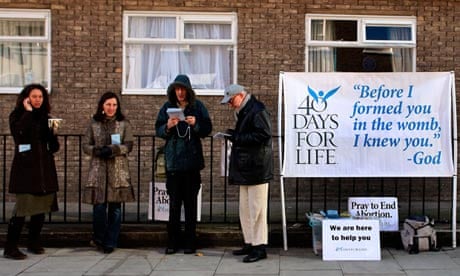Take a second to track the anti-abortion moves that have been made, in and outside parliament, since the coalition took office. Nadine Dorries was quick out of the blocks, tabling the following amendments to the health and social care bill: the need for "independent" counselling for women who seek abortions; and the need to move responsibility for abortion guidelines from the Royal College of Obstetricians and Gynaecologists to the National Institute of Clinical Excellence.
That sounded pretty mild, until you looked closer at the measures: first, the reason she wanted to take counselling duties away from abortion providers is that she characterised them as salespeople – she was attempting to show that they couldn't possibly provide impartial and balanced advice, because of their own commercial concerns.
I was quite polite about it at the time, because I thought it was so obviously, off-the-scale absurd that it didn't need detailed examination. The British Pregnancy Advisory Service (BPAS), the main focus of Dorries' disapprobation, is a not-for-profit organisation staffed by women (I hope they won't be offended) for whom the term "do-gooder" was intended. The idea that they would try to steer you in any direction for the sake of their own salaries is absolutely laughable – you might just as well suggest that the reason there were so few copies of The Da Vinci Code in your Oxfam bookshop was that the staff were in the pay of the Vatican.
The slur against the RCOG was similar. Dorries told me: "There is a specific committee which develops the guidelines for the care of a woman seeking terminations. They're all abortionists. They all earn their living from abortions." Again, I thought this was self-evidently ridiculous. They're not "abortionists", they're doctors. The idea that a gang of specialist doctors would get together to cook up guidelines in which the health of the patient was irrelevant, just to improve market conditions for their specialism – even if you were about to privatise the health service, you couldn't really believe this. But apparently she did.
It turns out I was right on the obvious stuff – nobody swallowed the arguments, and the amendments were defeated by 250 votes – but possibly wrong on Dorries' original intention. It didn't matter whether the amendments went through; it just created a huge amount of static around those opening propositions, that abortion providers were snake-oil salesmen and the RCOG were mercenary. It has now become routine, in the name of balance (balance!), to suggest that BPAS counsellors aren't "independent" (whereas Christian groups suddenly are).
The RCOG – and I have never had a satisfactory explanation for this – did not defend themselves. Despite the huge defeat of the amendment, the original plan to strip BPAS of its counselling role is going ahead. Diane Abbott walked off the cross-party committee in disgust. The effects of this – a total bypass of parliamentary process in favour of an anti-abortion agenda, dressed up as an unfounded paranoia – have yet to be seen.
What you can see are the ambient changes. The anti-abortion group 40 Days for Life harassed women going into the BPAS clinic on Bedford Square in London every day through Lent. They film the women coming in and claim they're keeping a visual record for their "own protection". "They've become emboldened recently," said Jenni Bristow, editor of the BPAS magazine. "I think because they've detected a shifting climate on abortion."
They haven't detected it from nowhere. Alongside the growing anti-abortion influence in Westminster, you have the Telegraph's campaign against sex-selective abortion. In what was essentially a sting operation, they sent a journalist around a number of clinics to pretend to want an abortion on the basis of sex. Very few doctors bought it, because it never happens. Women don't march into clinics saying, "I want a sex-selection abortion" unless they're undercover journalists. But three unfortunate doctors made the mistake of saying, "It's none of my business", and now they've been suspended. If you saw it as a plot line in a soap opera, you'd reject it for being too dated and too improbable. In real life, the health secretary Andrew Lansley weighed in and the police are investigating. Sit tight, and watch it unfold into nothing.
It's a useful reminder, if one were needed, that there's no technique too mendacious, too meddlesome or too unpleasant for people who think other woman's reproductive organs are de facto their business. Ignoring them, as tempting as it is, probably won't make them go away.




